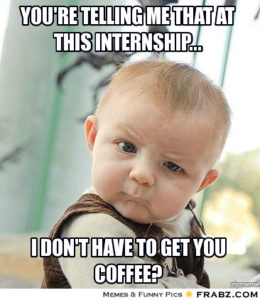 Everyone can relate to the dreadful feeling that washes over you the morning before your first day at your new internship. The type of anxiety that twists your stomach into knots, forces beads of sweat to appear on your forehead, and makes you second-guess your first-day outfit choice one too many times. As you step foot into your new office, your mind runs at a million miles per minute, ridden with mixed emotions and most of all, fear. Unsure of what lies ahead, you deliberate: Will I enjoy my time at this company? Will I contribute and make a lasting impact? What happens if I hate it??
Everyone can relate to the dreadful feeling that washes over you the morning before your first day at your new internship. The type of anxiety that twists your stomach into knots, forces beads of sweat to appear on your forehead, and makes you second-guess your first-day outfit choice one too many times. As you step foot into your new office, your mind runs at a million miles per minute, ridden with mixed emotions and most of all, fear. Unsure of what lies ahead, you deliberate: Will I enjoy my time at this company? Will I contribute and make a lasting impact? What happens if I hate it??
In reality, not only can we all relate to the anxious feeling leading up to our first day on the job, but we can also empathize with the disappointment or surprise when faced with the reality behind the position description you initially read on the job posting.
My personal experiences with internships in the past have taught me many valuable lessons on what to take away from an employment opportunity, regardless of whether my experience was positive or negative. After being accepted to a renowned company as their summer intern two summers ago, I was more excited than ever to begin summer. As the weeks flew by, and my initial anxiety faded, I came to realize that I hated everything about what I was doing. Nothing had prepared me for the fact that I would be stuck doing chores completely unrelated to the position description, feeling as if I was gaining no valuable skills, performing mindless and laborious tasks with no credit, and without pay to top it all off. It was almost tragic–the buildup and anticipation that I had held onto as I awaited summer because of this job came to a crashing halt, and I dreaded crossing the Golden Gate every morning to go to work.
At that point, I knew I had to do something to change the course of where this suddenly grim summer was heading. After working my connections, I was given the opportunity to work with a company, alongside the company executive, that changed my life and point of view, and turned my summer around. I began working two jobs, knowing I needed an escape from my original position, but not wanting to quit as I had come too far already. The new perspectives and diversity of skills I gained as an employee of the agency (no intern title here!), made me recognize my true potential and the innate skills I already had, which I was able to refine. Not only was I compensated for my work here, but I also felt as if I was given the credit I deserved for my hard work, which had a clear, constructive impact shortly after I arrived. I found myself at my first job, thinking about my second job and using any spare time I had to contact my boss with updates, research brand development, and mentally map out the photo series I was planning to create that following weekend. Eventually, my cubicle at my first job became littered with pink and purple post-it notes crowded with ideas and sketches for my second job.
At the end of the summer, coming out of both these diverging experiences, I realized that I had gained so much, when I previously thought what I had been doing was a waste of time. What I learned from the internship I hated was the fact that I need to have agency and a voice in the company where I work, and simply put, that I would never work in that professional sphere again. I was proud of myself for not quitting, even when I was driven to the edge of my patience, and instead, pushed myself to find something that would occupy my mind and time positively. I took full advantage of my original internship by speaking one-on-one with my superiors and the different artists I encountered, as well as with my other interns. In the end, I was able to make connections and lasting friendships, as well as find out more about my desired career path and myself. Clearly, I gained more than I ever could have imagined from the internship I loved, even having the opportunity to work remotely and for the following summer, which turned out to be even better and more rewarding than the last. Reflecting on my time with this company, I notice that because I was able to wear so many hats and was given many responsibilities where I was able to use my creative perspective and drive to fulfill these goals, I flourished and grew as a young professional and young woman.
In the end, although the initial awe and glamour may wear off, even when you find yourself fetching coffee, spending three hours fixing an evil photocopy machine, or doing any other stereotypical, mind-numbing intern work, there can always be a positive outcome from any experience. Whether that is figuring out exactly where you don’t want to end up, calculating the next steps towards getting where you do want to be, or even making a new connection, you will gain something valuable if you make the best of your potentially despairing intern situation.
